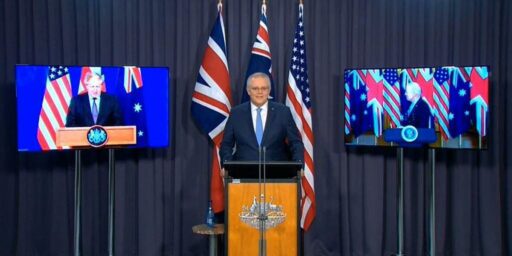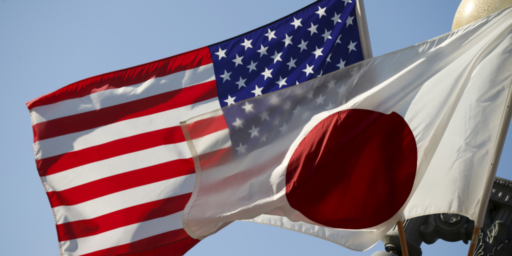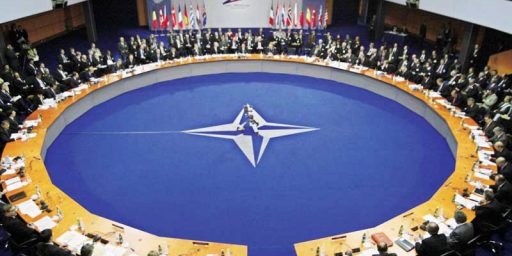Murdoch: NATO Faces ‘Crisis of Confidence’
News Corporation chairman Rupert Murdoch says that NATO is in a “crisis of confidence” because Western Europe is “losing its faith in the values and institutions that have kept us free.” He calls for a radical redefinition of the Alliance in order to save it, including extending membership to Australia, Japan, and Israel.
Murdoch, who is receiving the Atlantic Council of the United States’ Distinguished Business Leader Award for 2008, says in his prepared remarks that, “We must face up to a painful truth: Europe no longer has either the political will or social culture to support military engagements in defense of itself and its allies. However strong NATO may be on paper, this fact makes NATO weak in practice. And it means that reform will not come from within.” Accordingly, he continued, “we need to transform this Alliance from a community formed around a map to a community based on common values and a willingness to take joint action in defense of these values.” Indeed, he argued, “Expansion is the only hope of invigorating an Alliance weighed down by those who are no longer willing to commit themselves to defend its founding principles.”
Murdock contends that, “Around the world, there is no shortage of nations who share our values, and are willing to defend them. I am thinking of countries like Australia, which sent troops to Iraq … Israel, which has been fighting Islamic terrorism almost since its founding … and Japan, which generally follows a more ‘Western’ policy than most of Western Europe.” Ultimately, he argued, “If we continue to define the West or the Alliance as a strictly geographical concept, the Alliance will continue to erode. But if we define the West as a community of values, institutions, and a willingness to act jointly, we will revive an important bastion of freedom — and make it as pivotal in our own century as it was in the last.”
Murdoch cited his personal story as an example: “I was born in Australia, I received my university education in Britain, and I have made my home in America. Over a long and I hope productive life, I have learned that shared values are more important than shared borders.”
Speaking only for myself, I find Murdoch’s proposal very interesting. Indeed, I’ve long thought that Australia was a no-brainer* for NATO admission, given that they have stood shoulder-to-shoulder with U.S. and NATO forces throughout the history of the Alliance. Japan, too, seems a logical choice given their resources and recent movement toward more active engagement internationally.
Israel, obviously, is a different matter. While I agree that they share our values and have demonstrated enthusiastic willingness to take military action to defend them, they’re such a political hot potato that their inclusion would likely hinder more operations than they’d help.
The full text of Murdoch’s remarks will be available from the front page of the Atlantic Council website by morning.
*UPDATE: Talking to some experts at the Council, though, it seems that the yes-brainer folks disagree. Apparently, NATO-Plus has been bandied about for a while but there is strong concern that the Russians and Chinese would see this as a very dangerous encirclement.






You know, I’ve heard this said a thousand times. What I haven’t seen, however, is evidence to back it up apart from a general relucantance to follow the U.S.’s lead into Iraq.
You can tell he has no major businesses in France and germany, can’t you. Yet both are involved in Afghanistan and the French recently committed to sending more troops – a counterexample to his argument. Australia just began to pull out of Iraq – another one.
If NATO is simply to provide more muscle for English-speaking neoconservative and neoliberal adventurism, maybe it would be better to let it die. Or maybe we should be looking for a NATO that isn’t expected simply to provide foreign support for such adventures.
I’ll take a leaf from you, James, and propose that NATO would serve better retooled as a peacekeeping/humanitarian/reconstructive alliance. I’m fairly sure most of the Euro-nations would be happier to back such a repurposing than the one Murdoch proposes.
Regards, C
Clearly, American’s moral character cannot survive an influx of foreigners who lack a commitment to democratic values and the rule of law.
Murdoch’s visa should be yanked and he should be deported immediately.
“Australia just began to pull out of Iraq – another one.”
I think the degree to which the Iraq War was unpopular in Australia is actually often quite seriously under-recognised in a lot of American commentary on this issue. Although John Howard paid less of an immediate price than Tony Blair for his support of the invasion, the war was actually no more popular in Australia than it was in the United Kingdom. Indeed, some polls seem to indicate that it enjoyed more support among the British public than among Australians.
I also think that the extent of pro-Americanism among the Australian public tends to be overstated, possibly due to the increased recent strategic co-operation between the two countries due to shared regional security concerns. At least one recent (post Iraq invasion) poll detailing Australian attitudes toward foreign powers saw the USA doing reasonably well when it came to positive perceptions measured on an absolute scale, but far less well when ranked relatively against other powers — most notably, China was actually more favourably viewed than the USA, which I think flies in the face of many of the assumptions that enjoy common currency when Australia is being discussed.
Of course there are the minor point of Japan having a constitution limiting their forces to self defense. And as noted, under Sarkozy, France is certainly stepping up to the plate. Italy is likely to also start to shoulder their load with the new government. Denmark has been punching above its weight. And then we have eastern Europe.
I think what you really have is the concept of a democracies only UN the McCain floated a couple of weeks ago.
Anthony:
Thats more than likely influenced by the fact we’re making a damned mint off the Chinese. The US is not making us nearly so much money at the moment. Partly because of this, Sino-Australian ties are deeper than Sino-American ties. As such, US-Chinese popularity polls in Australia give results more skewed than the average American would expect and is a poor for determining Australia’s support for the West and/or the US.
Furthermore, war between the US and China would place us (Australia) in a diabolical position, where neutrality is difficult but breaking our ties with China would be unthinkable and reneging on our alliances with the US impossible. It is the nightmare scenario for any Australian Prime Minister.
Also, the unpopularity of the Iraq War is deceptive. Speaking as a voter who followed the ’07 elections very closely, I would posit that the depth of that unpopularity (broad as it was) was very minor. It did not play a large role in the election, in its advertising or in its debates.
Certainly, the depth of anti-American sentiment in Australia is nothing compared to that of your European allies already in NATO.
Cernig:
“Yet both are involved in Afghanistan and the French recently committed to sending more troops – a counterexample to his argument.”
You are being deceptive.
Both of their committments are limited, especially given the size of both nations. Furthermore, Germany’s are on very rapid rotations that do not extend much beyond own force protection, considerably less than that of the Dutch, Canadians or even Australians, all much small nations.
France’s extra committment is coming on the backs of their new leader Sarkozy, who is something of an aberration for French politics, pro-American as he is. It is worth noting though, that during the French-brokered peacekeeping force for Lebanon, France initially attempted to skimp with a very token force until the international reaction guilt-tripped them into contributing the bulk of the force.
Whilst we can all take heart at the election of Sarkozy and the contribution of more troops, there is still the matter of how permanent this shift in French sentiment is and also the Rules of Engagement their troops will follow in Afghanistan.
I mean really guys, come on, when France and Germany’s contribution to something as elementary as Afghanistan is outmatched by Canada or the Netherlands, something has hit the fan.
Seriously.
I am a former USAF historian. France is NOT stepping up to the plate–if Sarkozy’s promised additional troops arrive, they will go into the north of Afghanistan to free up US forces for the hard work down south. The Australians rotate in and out of Afghanistan–they are not “pulling out.” The brunt of fighting in southern Afghanistan has been borne by the US, Canada, Australian, Britain, and Denmark. The rest of the Western European part of NATO has been lacking. And it’s not just Afghanistan or Iraq. Most of Western Europe spends so little of its GDP on defense as to make their forces nearly worthless for anything but protecting their own borders. And even that is questionable since Europe has to pool resources to buy transport, AWACSs, or refueling aircraft. Their force capabilities have nothing like the long range strike, Intelligence/Surveillance/Reconnaissance, heavy lift, or long range refueling capabilities of the US, and to a lesser extent, Britain and France. Western Europe could have first rate militaries but they choose to spend their money on social programs and let the Anglosphere protect them from harm. Rupert is right–time to build a new alliance of those nations who actually put their money where their mouths are.